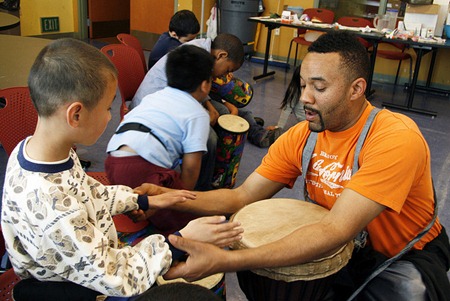Making Its Case: Performing Arts Workshop Attracts Funders in a Down Economy
Photo: Drumming with Jason Brown at Visitacion Valley Boys & Girls Club, from the Performing Arts Workshop Flickr
While tough economic times have forced many arts organizations to cut back on staff and programs — or worse, close their doors — Performing Arts Workshop in San Francisco is expanding its reach to help even greater numbers of at-risk youth.
“The information we have been able to present about our programs has allowed us to make our case and secure funding when many other nonprofits have not been so fortunate,” says Anne Trickey, the nonprofit organization’s program and communications manager.
But this wasn’t always the case. Before the Workshop started using Microsoft Office 2010, important communications and fundraising vehicles sometimes got short shrift. For example, its annual report wasn’t always annual, admits Trickey. “We rely heavily on our donated Microsoft products from TechSoup to fulfill our mission and demonstrate the effects of high-quality arts education,” she says.
Without the new features of Office 2010, Trickey says it would be challenging to compile data for the organization’s annual program report in a timely fashion. “I especially love Microsoft Excel’s graph and chart features that allow us to pinpoint the exact data we wish to highlight and present it in a manner that’s consistent with our brand and formatting,” she says. Staff then uses this data to illustrate in Microsoft Word areas where the organization is excelling and where it can improve. “The report formatting allows us to present this data in a visually appealing way for internal stakeholders as well as funders,” explains Trickey.
Dedicated to helping young people develop critical thinking, creative expression, and basic learning skills through the arts, Performing Arts Workshop was established in 1965 to provide a creative outlet for inner-city teenagers. It was based originally at the Telegraph Hill Community Center and later at the Buchanan Street YMCA. Founder Gloria Unti led neighborhood youth— most of whom were in gangs or had dropped out of school —through improvisational dance and theatre.
Today, the Workshop’s commitment to underserved youth is stronger than ever. Its Artists-in-Schools and Artists-in-Communities programs reach thousands of young people in public schools, transitional housing facilities, and community centers each year. “Five years ago we were serving approximately 4,000 youth. Now that number is over 9,000,” says Trickey.
Each year, with the help of Microsoft PowerPoint, Trickey presents program highlights to the Workshop board and administrative staff at the organization’s annual retreat. “It’s very important for us to be able to strategically assess our impact over time and make decisions that affect programming for next year,” she says.
The organization also uses Microsoft PowerPoint as a training tool for its artistic staff. “Being able to link to documents and websites directly from the PowerPoint presentation keeps the teaching artists engaged and conveys the large volume of necessary information more easily,” notes Trickey.
Demonstrable results have never been more important for nonprofits to get noticed and win the favor of funders. “Before Performing Arts Workshop had Microsoft Office, we didn’t have a way to provide a quick overview of the necessity of the arts in education,” Trickey explains. Now the Workshop creates multiple handouts with graphic images, created from data compiled and formatted using Microsoft products, to tell its story in a compelling way. “We are able to successfully promote the benefits of teaching critical thinking and creative expression and to extend the reach of our advocacy efforts,” she says, “And it’s the TechSoup donations of Microsoft Office 2010 that made all this happen!”
To learn more about the Microsoft Software Donation Program, visit www.TechSoup.org/Microsoft.
